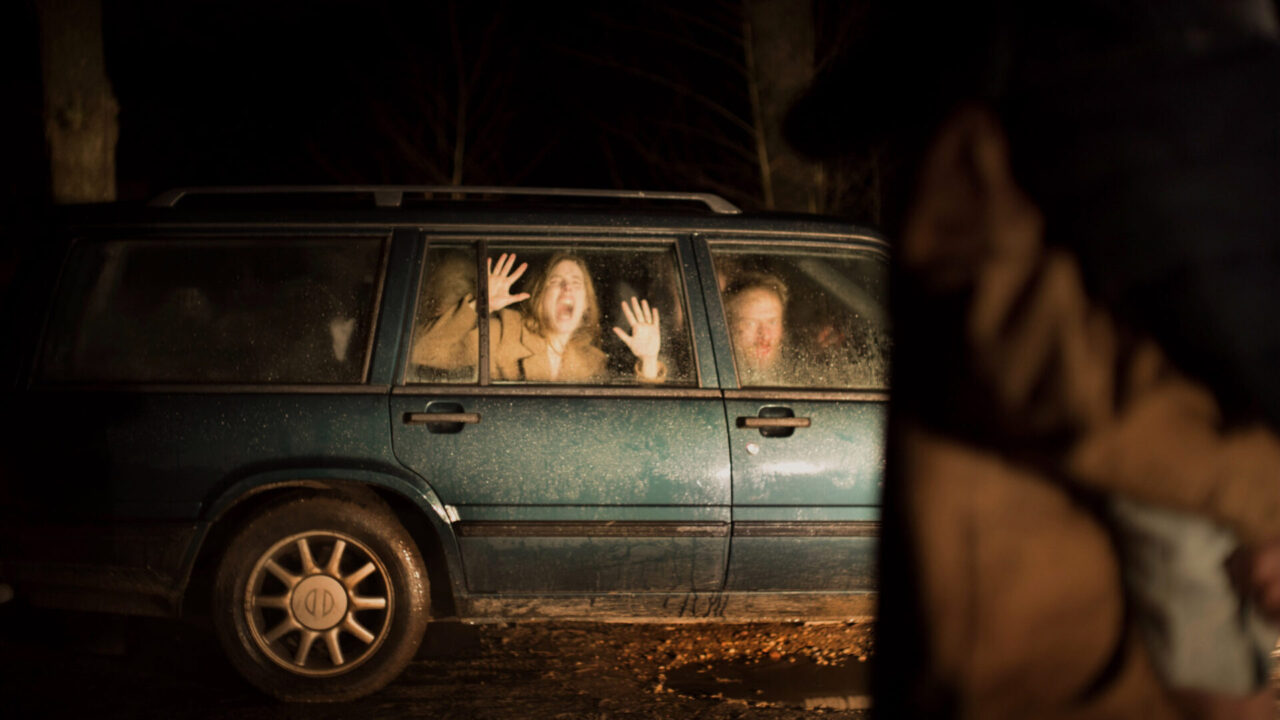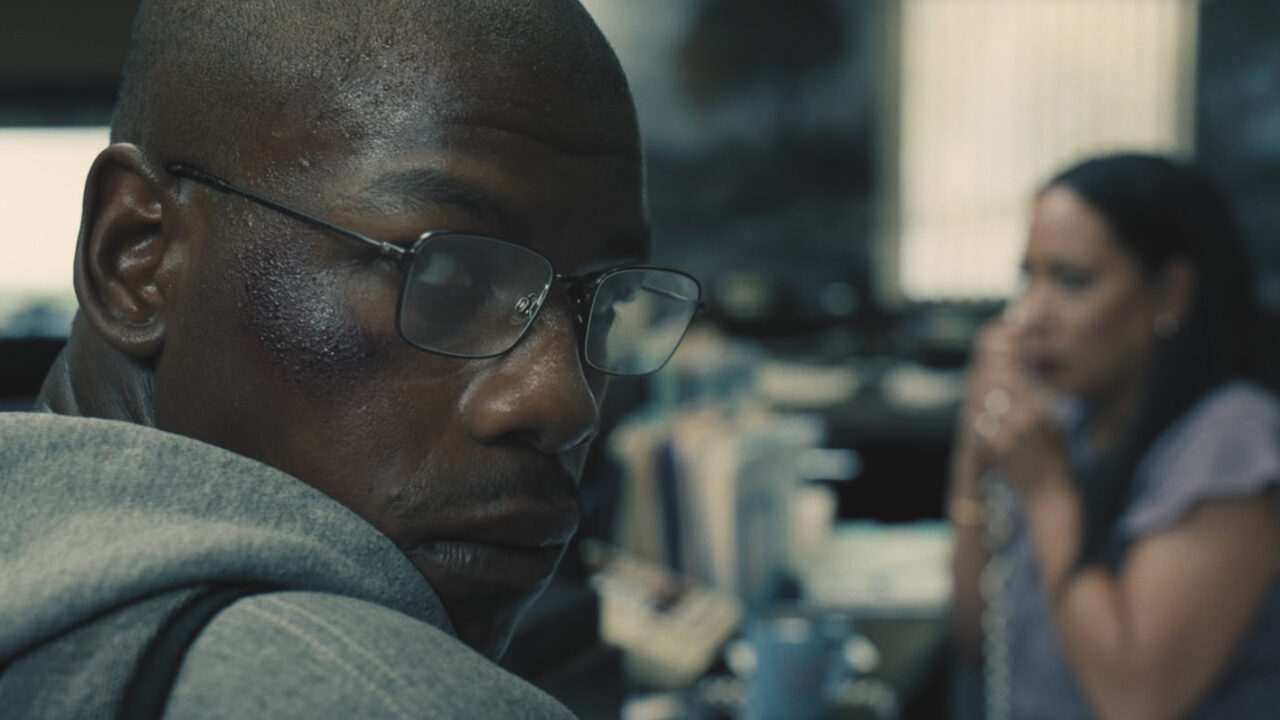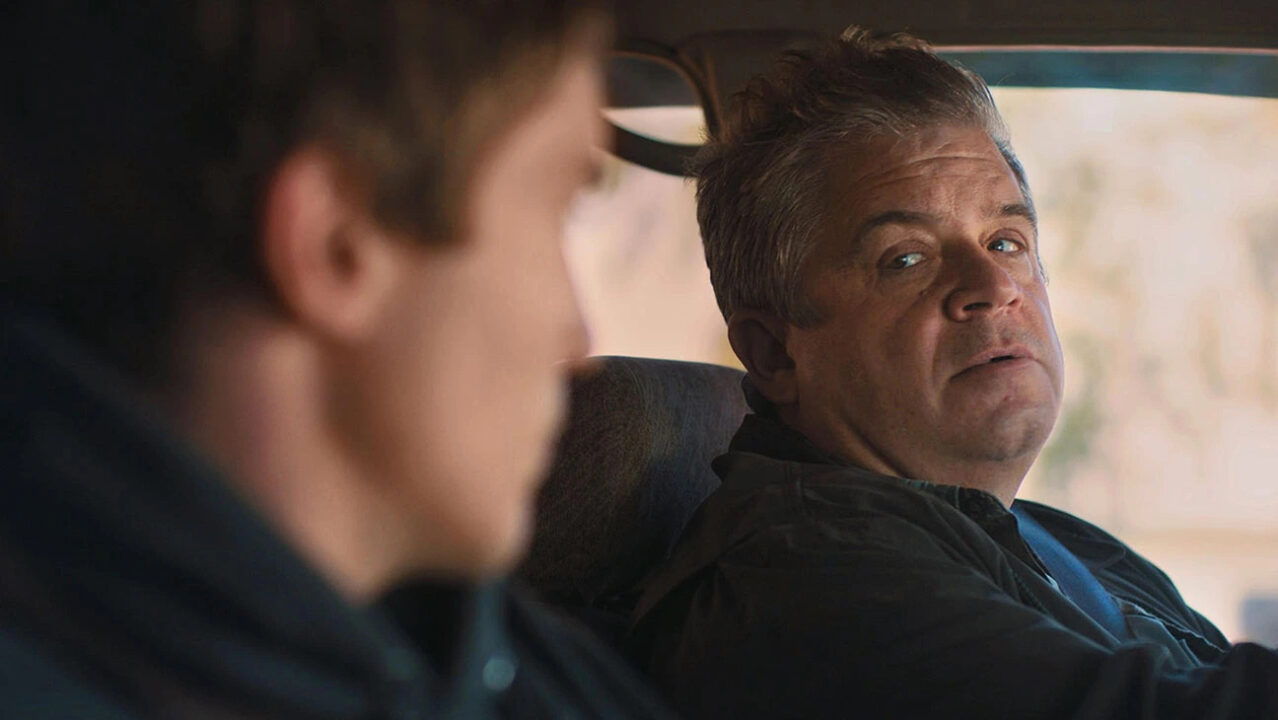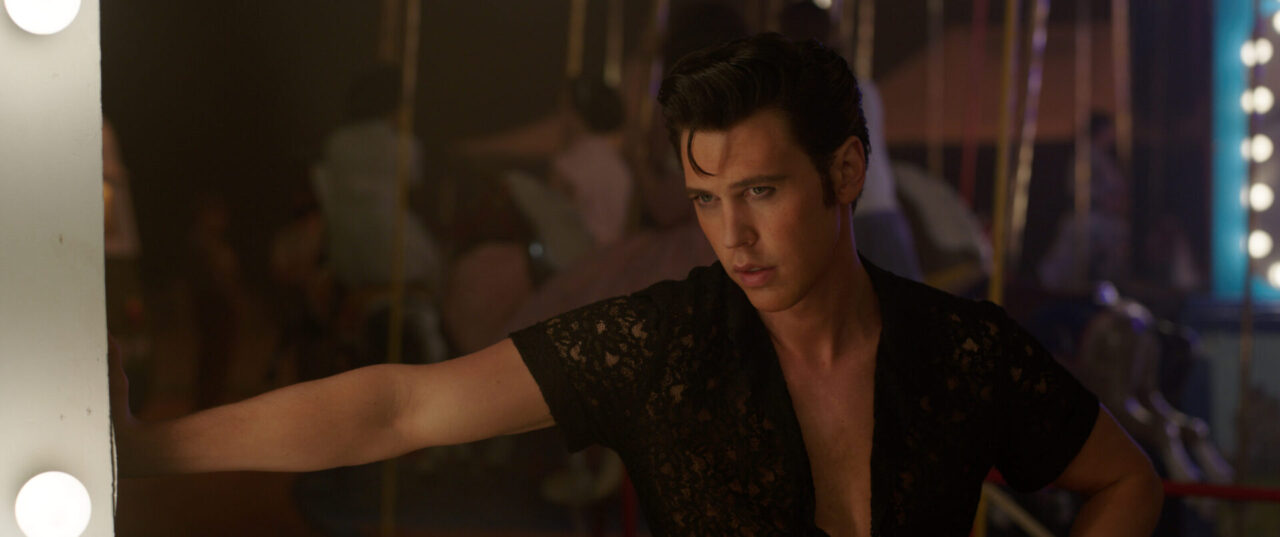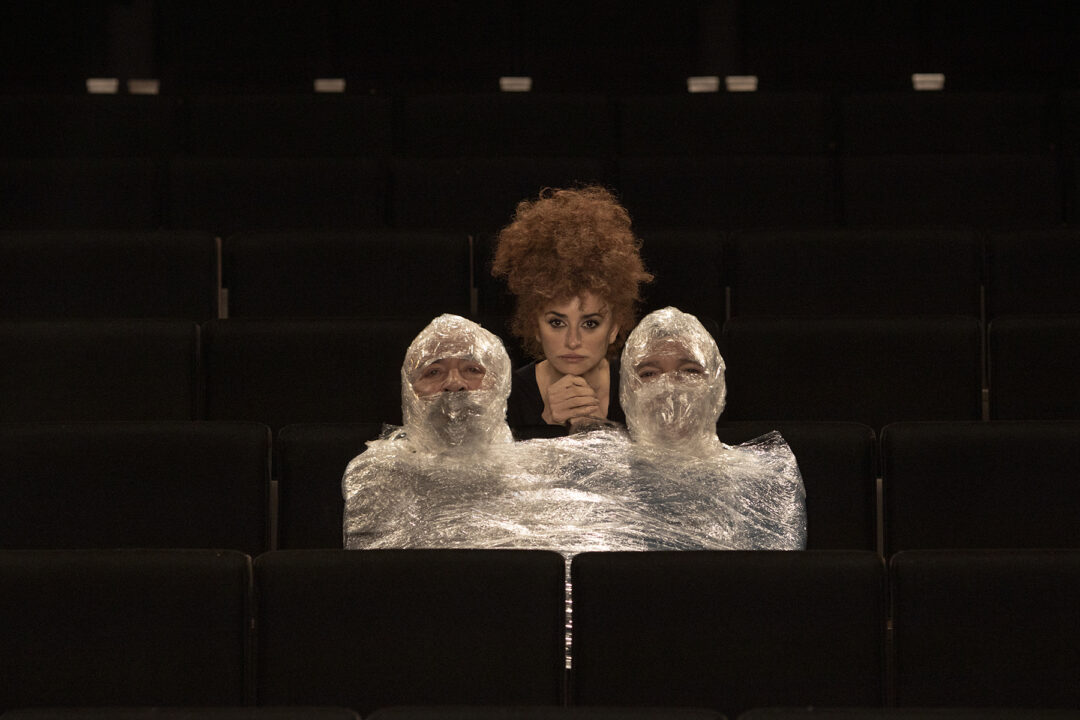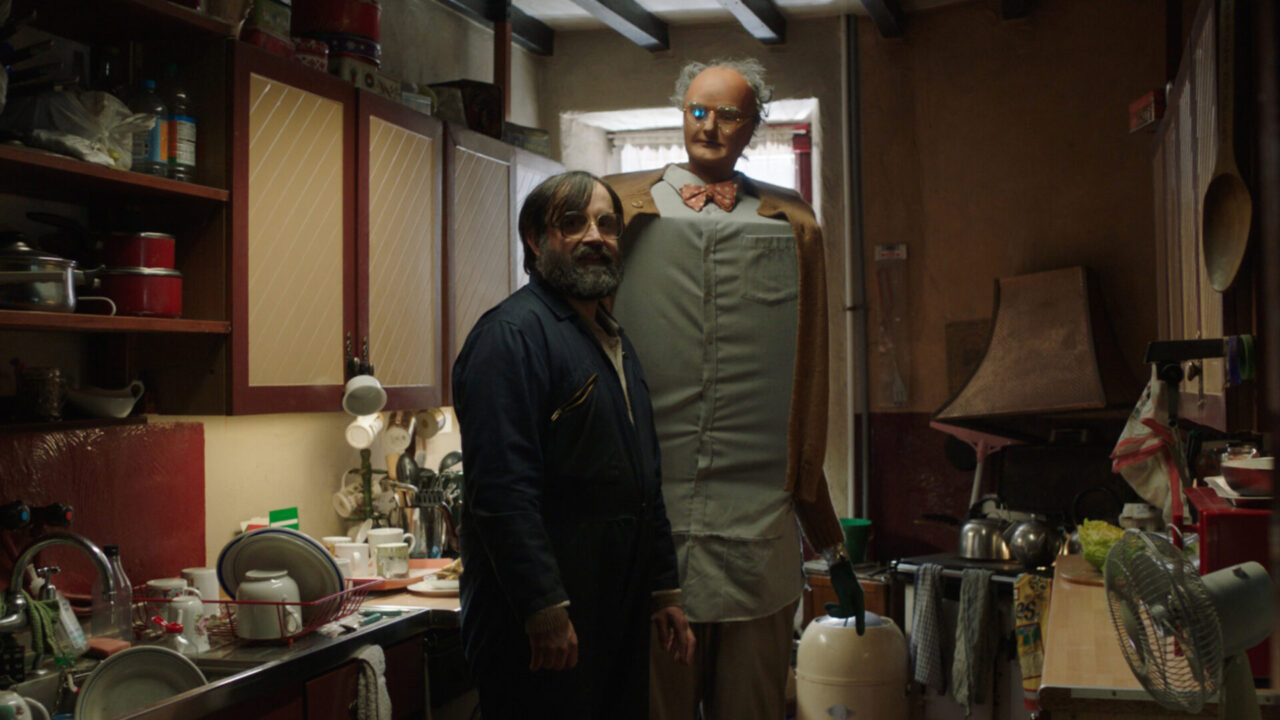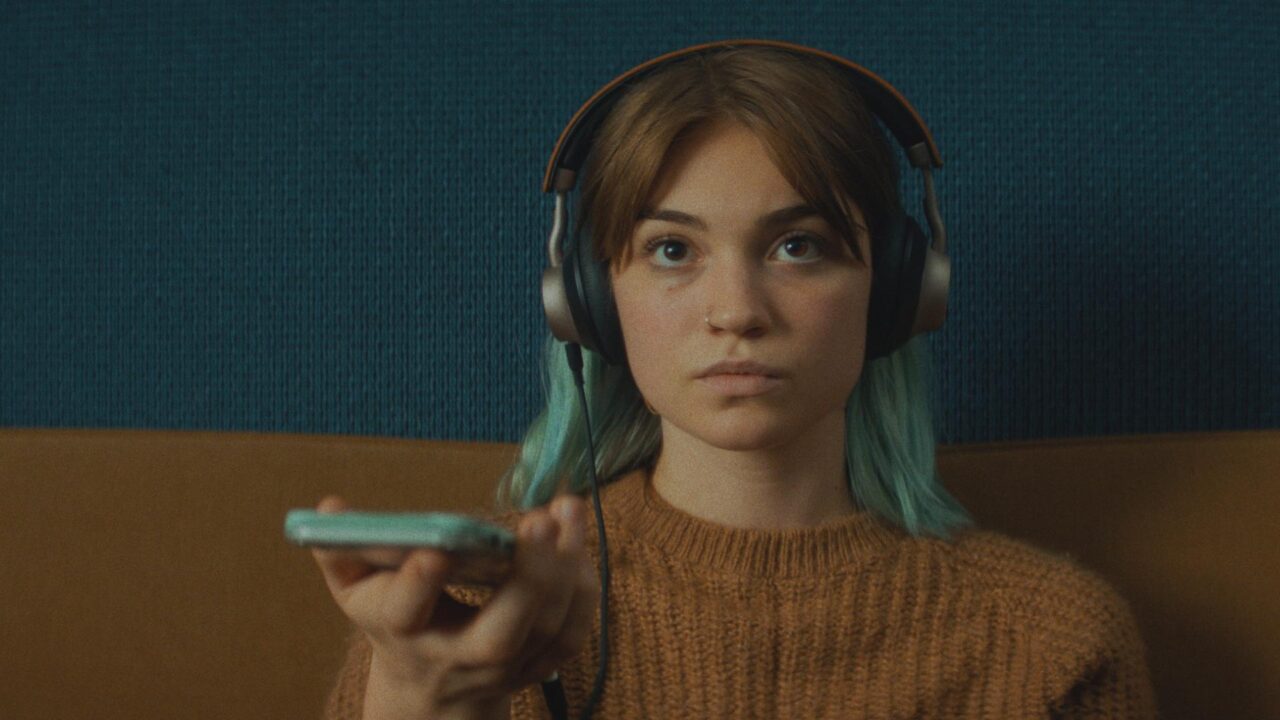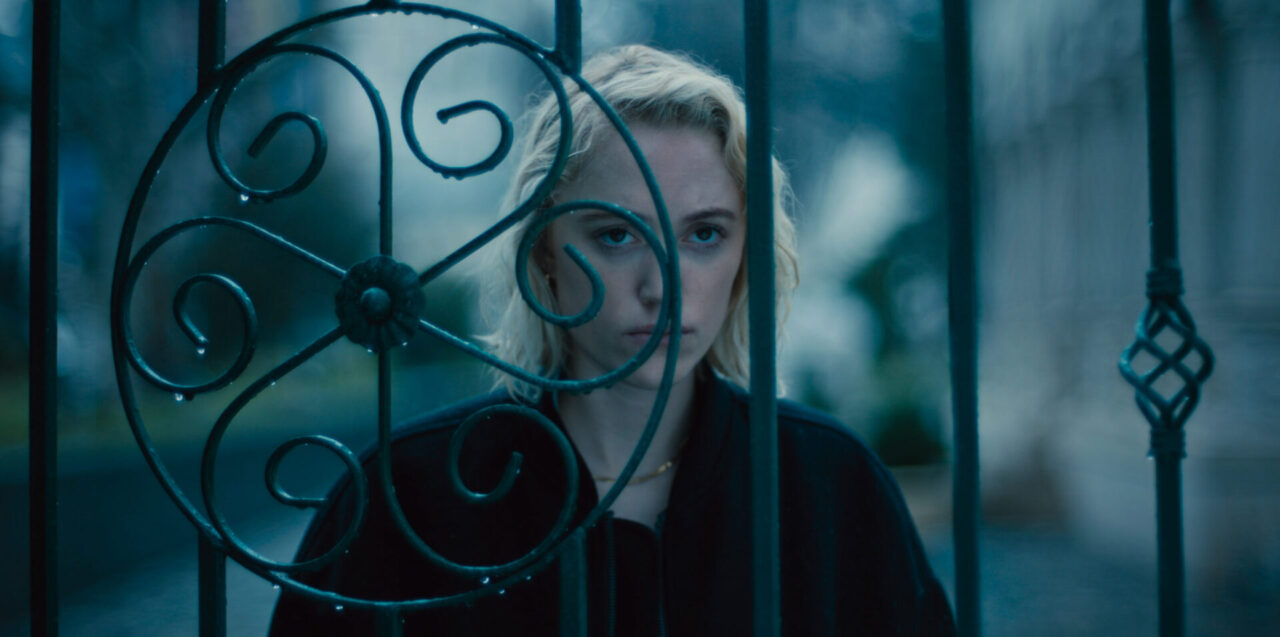'Speak No Evil' May Be The Most Disturbing Movie of the Year
While introducing his new film Speak No Evil during its world premiere at the Sundance Film Festival–where it played as part of the fest's Midnight section–Danish director Christian Tafdrup shared with his virtual audience, "I wanted to make the most unpleasant watch ever."
As if that weren't enough to put everyone on edge, Tafdrup continued to share that in writing this movie, he was inspired by the filmmaking of none other than the king of discomfort, Lars Von Trier. That was enough to set my heart pounding, unsure of what sort of depraved evil would be in store for us all. And after watching Speak No Evil, I was only barely prepared for what horrors lay ahead in this smart, disturbing and heart-pounding new Danish horror film.
When a Danish family of three vacations in Italy one summer, they are pleased to meet a fun Dutch family at their shared lodging. Bjørn (Morten Burian) and his wife Louise (Sidsel Siem Koch) are excited to bond with the charismatic Patrick (Fedja van Huêt) and Karin (Karina Smulders). It's also fitting that their young daughter Agnes (Liva Forsberg) is also around the same age as the couple's son, Abel (Marius Damslev).
It's a fun affair but the magic of the Tuscany vacation becomes a distant memory when Bjørn and Louise return to their humdrum lives (he's clearly unhappy with his normal life). It's not until a year later when a postcard arrives–a photograph of both families together from their idyllic Italian summer–that their spirits lift. They've been invited by Patrick and Karin to reconnect and spend the weekend at their home; and offer that excites them, to which they accept.
A short 8-hour car trip away, Bjørn, Louise, and Agnes arrive at their host's house deep in the woods (the kind of place that would be very regrettable to get stuck in, on the unlikely chance that any danger should arise). They are instantly greeted and welcomed by fun-loving Patrick and Karin, and the promise of a fun weekend lies ahead.

However, small awkward cues arise in Patrick and Karin's hospitality that cause unexpected moments of unease to Bjørn and Louise. Little things that were so touching over that summer–Patrick's compliments over Louise's vegetarianism–are forgotten, with wild boar being that night's main course. But Bjørn and Louise, not wishing to rock the boat, brush it off, and continue with the weekend. It's not life or death, anyway.
It should be said at this point that Speak No Evil makes no attempt to hide its horror leanings. Tafdrup uses a sweeping symphonic score of strings that cause your body to tense up during their car trip to the house, and the loud, rustling of leaves once they're there only stir further dread. But it's the small moments of observed human behavior that Tafdrup is so skilled at capturing, making the audience cringe with discomfort, building a slowly rising tension.
Fedja van Huêt, Sidsel Siem Koch, Karina Smulders and Morten Burian appear in Speak No Evil by Christian Tafdrup, an official selection of the Midnight section at the 2022 Sundance Film Festival. Courtesy of Sundance Institute | photo by Erik Molberg.
Unfortunately, Bjørn and Louise's uncertainty with the weekend continues, especially when they learn why Abel stares strangely and groans loudly at night: Patrick and Karin share that he has a rare disease that stopped his tongue from growing. An awkward dinner the next night leads Bjørn and Louise to wonder if, maybe they aren't the same fun-loving family they met on vacation, and perhaps it would be best if they cut the trip short and went home.
To give anything else away at this point would undoubtedly spoil the rest of the film's fun, and there is quite a lot of twisted reveals ahead. Co-written with his brother Mads, Speak No Evil is Tafdrup's third feature film and also his first to get accepted into the Sundance Film festival. Surprisingly, it's also his first attempt at making a horror film. "I have no experience with making horror. I'm not a horror fan, I like to use it in an artistic way."
Approaching the story from this angle is what makes Speak No Evil such a unique and affecting movie. Creating characters with such developed stories and real human desires (Bjørn's dishonesty with his boring life and Louise's niceties to others) is a smart way of leading them into the danger ahead. The way we act in everyday life–what we don't say or wish to admit about ourselves, and what we hold back from others for the sake of being polite–can have the direst consequences. Speak No Evil very much intends to leave you speechless, and believe me–it will.
This review was first published on January 26, 2022 during the Sundance Film Festival.
In 'Breaking,' A Desperate John Boyega Holds a Bank Hostage
Based on the true story of when former U.S. war veteran Brian Brown-Easley held a bank hostage after being denied his disability pay from the VA, Breaking (formerly 892) is a suspenseful thriller that also shines a poignant light on the injustices that veterans still suffer in our country today.
Directed by Abi Damaris Corbin from a script she wrote with Kwame Kwei-Armah (based on this article), Breaking combines the best of big-screen movie-making with more emotional, human storytelling. I've seen and enjoyed Hollywood's exciting hostage standoffs before, but knowing that this story was based on a real event makes the film resonate a little differently while watching.
In the lead role, John Boyega plays the aforementioned Brian, a former U.S. Marine who now collects disability payments just to get by–which he's barely doing. He makes long walks to his low-income motel where he stays, and his only relief is talking with his daughter on the phone every night (but even that gets cut off). When a processing error from the VA denies Brian's latest disability payment, he's threatened with becoming homeless, and he's finally pushed to the brink.
The next day, Brian calmly walks into a local Wells Fargo bank in Atlanta and, after politely interacting with the bank teller, calmly informs her that he has a bomb in his backpack. Here, the story is set on its suspenseful course. But something's different about this holdup. Brian lets most of the people in the bank go right away, and calmly requests his demands: to speak to a hostage negotiator and have his story televised by the local news outlets.
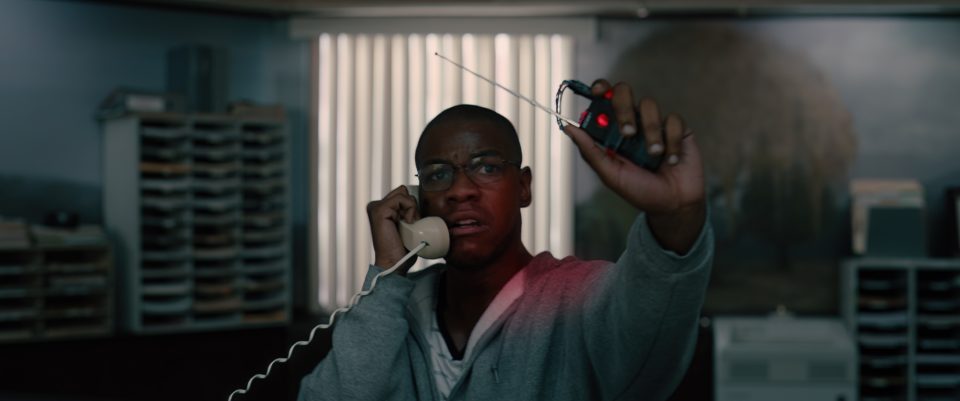
We find that Brian is a man who, although incredibly conflicted, still has a good heart. It's clear he doesn't intend to do harm to anyone, including his two hostages, Estel Valerie (Nicole Beharie) and Rosa Diaz (Selenis Leyva). He apologizes repeatedly to them for the situation he's put them in, and at one point even answers one of the bank's phone calls from someone asking questions about her 401k–who he attempts to help. When the bank offers to credit his account, he denies the offer. It needs to come from the VA, and the events that he's creating are the only way that they, and the rest of the world, will finally listen.
It's exciting to see Boyega in this role, playing a real-life character from this world, and not a galaxy far, far away. Boyega's baggy clothes, raspy voice, and simple speech convey a different side of his acting that we haven't seen before, and extends his range greatly. The journey that Brian goes on is a demanding one, requiring everything that Boyega's got.
As the situation escalates, he talks with a news producer (Connie Britton) and eventually, the hostage negotiator (Michael K. Williams). A former veteran himself, his conversation with Brian creates a connection between them, and a bond forms. He sees Brian's plight, and his safety becomes his own concern as well. In his final film role, Williams commands the screen every time we see him. His presence alone gives unparalleled gravitas to this, as well as every film he's been on. And while he will sorely be missed, this is a worthy final performance to remember the late actor by.
Corbin balances the rising suspense of the hostage standoff along with the more intimate scenes of Brian and his tight circle of confidantes. Scenes with Rosa and Estel make us empathize with him more and more. As the suspense grows–from a quiet sunny day to, at its highest point, a barrage of helicopters, tanks, pop-up command centers, and reporters–Breaking also keeps Brian and his mission front and center. When we finally learn how much money he was denied and that he's asking for now, it stops the movie in its tracks with impact. Considering the dangerous situation he's put himself in (and how he knows he may not make it out alive), you realize that it's not the amount of money he's asking for that he's truly after, but simply raising awareness of the injustice that he, and many others, have been denied.
Without giving away the ending, Brian would likely be pleased to know that his story is now being told, and shared with the world. I hadn't heard this story before seeing this film, but now that I have, I'm saddened to think about the desperation that some people are met with, and the lengths they'll go to to make amends. Brian Brown-Easley shined a light on a deep problem in our country, and Breaking furthers that story. It's an issue that needs to be corrected at the federal level in order to ensure that those who serve our country need to be served back.
This review originally ran on January 25, 2022 during the Sundance Film Festival.
https://www.youtube.com/watch?v=5Vi3EhaNOII&ab_channel=BleeckerStreet
'I Love My Dad': A Cringe-Worthy Comedy About a Catfishing Dad
Of everything I watched at this year's SXSW film festival, I Love My Dad was among the best things I saw. I'm certainly not alone in feeling this way, as the film ended up receiving the Grand Jury Award (the top prize) in the Narrative Feature Competition.
I Love My Dad is an enjoyable indie comedy that's heartfelt and easy to connect with. This is saying a lot for a film with a very awkward setup, one that allegedly happened to writer-director-actor James Morosini. Franklin (Morosini) is a depressive high schooler who one day falls for a girl (Claudia Sulewski) who Facebook messages him out of the blue. Except, it's not actually her he's talking to, but his estranged father Chuck (Patton Oswalt) who's using a fake account to reconnect with his son after being shut out of his life.
It's a very out-there setup (and crazier still considering it's based on true events). For it to work in movie-form, though, the audience has to understand why anyone would do that to their child. Well-meaning but self-defeating dad Chuck has clearly burned all of the emotional bridges with his son after a lifetime of no-shows and disappointments. Even though Chuck hasn't been there for Franklin, he still wants to be in his life, especially knowing his son's struggle with depression. What follows is a cringe-worthy comedy in which Chuck creates a fake account as a way to reconnect with his son. While it's an insanely stupid idea, it's clearly stemming from concern rather than cruelty, which Patton Oswalt brings to the character with sad sincerity.
We see the beginning of normal Facebook messaging between Franklin and who he thinks is the cute and kind "Becca" (Sulewski), and watch the relationship build. Rather than simply see Franklin and Chuck type and read their messages to each other, Morosini makes the stylish choice to bring Becca into the room with Franklin, and their online dialogue plays out by occupying real physical space–it kind of feels like that, doesn't it?–on a rooftop, in the supermarket aisles. It jarringly cuts back to Franklin alone when we need to snap back into reality. It's a clever and engaging way to tell the story.
The problem with Chuck's plan, of course, is that the longer Chuck continues the rouse, the stronger Franklin falls for Becca. In a high-stakes and inevitable move, Franklin decides to meet Becca. Who else decides to drive him, but his nervously sweating father, Chuck. I Love My Dad takes it to the actually cringe-worthy lines when Franklin and Becca engage in deeply intimate messaging, leading to a climax involving Franklin and his dad–locked into continuing the facade–making for an awkward next morning.
Beyond being an enjoyable comedy, what makes the film emotionally engaging and smart is that Morosini doesn't overdo these deeply uncomfortable moments but rather balances them with empathy and understanding. One can only imagine how Morosini handled that shocking WTF reveal in real life when he learned of his dad's unintentional catfishing. But in the film, there's impressive wisdom in how he portrays this story. It's also an impressive study of how humans long to connect and the role that technology plays in helping and impeding that from happening.
I Love My Dad announces the arrival of new young talent James Morosini. It's understandable why he opted to wear all the hats here, credited as the film's screenwriter, director, and co-lead actor. Not only is the story based on his life experience, but it's one that's so comically awkward that you really do need that person to tell the story.
I Love My Dad combines a variety of honest human storytelling: humor, sadness, and our need to connect while also showing how technology helps and impedes that from happening. Kudos to the now 30-year-old filmmaker, who has successfully turned a traumatizing episode into an entertaining, heartfelt, and charming indie feature.
This review originally ran on March 21, 2022, during the SXSW Film Festival.
'Elvis': Baz Luhrmann's Wildly Operatic Bio Pic Is Fit For A King
Where to watch: 'Elvis' is now playing in theaters nationwide.
The biggest thought I had while leaving the building after watching Elvis was, "Boy... that was a lot." Director Baz Luhrmann (Moulin Rouge!) succeeds in bringing the King of Rock and Roll's outlandish life story to the big screen in the most oversized, music-filled way imaginable. And yet, after being visually overloaded with this hyper-real staging of the rise-and-fall of Elvis Aaron Presley over 159 minutes, I also felt an unexpected solemnity. Surprisingly, an emotional connection had been forged with the man who, in real life, died a parody of his former self, but who in this sensationally operatic version of a bio-pic remix is given new life in his depiction as a lonely but culture-changing star.
With its high-flying camerawork and neck-snappingly quick editing, it's clear from the start that Elvis doesn't intend to play by the same rules that have kept other recent rock icon bio pics earth-bound. Baz Luhrmann–the unapologetically showy maximalist that he is–very much puts his visual stamp and spin on things here, even to the extent that, on the whole, the film largely overpowers the iconic entertainer's own star power. But it's this free-wheeling, unrestrained spirit that makes for a wholly unique viewing experience and tells Elvis's story in a fresh and exciting new way.
Beyond Elvis's singular style, the other key device that makes the film more than a traditional bio pic is the story that Luhrmann and Jeremy Doner choose to tell here (both also share screenplay credit with Sam Bromell and Craig Pearce). Elvis is not just the story of the Memphis-born singer only, but also that of his lifelong manipulative manager, Colonel Tom Parker, who many believe was largely responsible for not only Elvis's fall from grace, but even his premature death. A slippery snake oil salesman whose backstory is as unbelievable as his self-given suffix, "The Colonel" is here payed by Tom Hanks (whose combination of prosthetics and ambiguously European accent result in something between Cristoph Waltz and Foghorn Leghorn).
The Colonel's gleefully mischievous narration that opens the film and pops up throughout feels like a dark wizard ominously stirring a cauldron. We see that Elvis's story starts where The Colonel's begins: as a traveling circus leader promoting circus freaks and country singers through rural Americana. Always looking for the next attraction, he nearly dismisses a new Blues artist singing "That's All Right" on a nearby record player, until he learns with amazement: "He's whiiiite?" The potential opportunity for commercial success is instantly sparked, leading to chasing down his new fixation. After seeing young Elvis's (Austin Butler) power of possession to entrance the youth through his electrically arresting hip-shaking gyrations (which comically recalls 2001's early ape howls of new self-consciousness), he dangles a career to him like an evil genie. Young and naive and fueled by his love of music, Elvis agrees to The Colonel's proposal, and it's off to a future and relationship that would change the world.
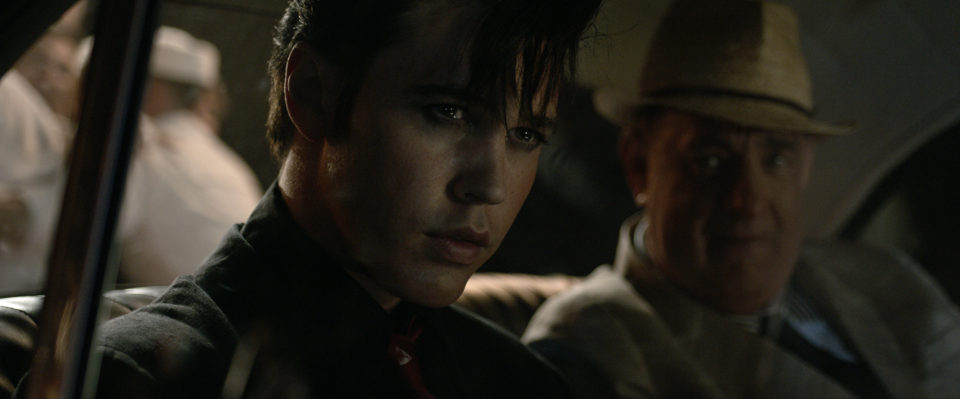
Elvis is definitely at its weakest when it feels obligated to play out the Greatest Hits moments of his life. Definitely narratively overstuffed, it's tough for the film to build any real sense of varying levels of drama, making every scene "the most" of what it can be. The other big swing that the film unfortunately misses is its attempt to link The Colonel and Elvis's stories of self-made creation together in similar fashion (a thematic through-line that also runs through Baz's remake of The Great Gatsby). "You and I are the same, my dear boy," The Colonel reminds Elvis and the audience throughout the film, which furthers the plot more so than any real emotional stakes.
Elvis is at its best and most captivating when it's not narratively bound. Baz Luhrmann's canvas is not one of realism, but expressionism. When the film wishes show how it might have felt experiencing Elvis's stardom at the time, it's electric. Going all the way back to seeing a Young Elvis (Chaydon Jay) wander into a Gospel-bumping tent and becoming possessed by the sweat-filled claps and shakes from the African American community, is heart-pounding. Hearing the distortion-laced electric guitar solo that accompanies Elvis's first dance moves, is gripping. And living through Elvis's final years, playing out a Vegas residency that would become his elephant's graveyard, is heartbreaking to watch him shut away in that hotel.
Austin Butler as Elvis is not just good. He very well might have been born to play Elvis in a big screen movie. What's beyond impressive–besides the fact that Butler is able to talk, sing, and dance like the singer–is that he impersonates the entertainer impeccably at every stage of his life; from early break through, to middling mid-career, to sweat-faced final act. His mannerisms are perfect, and perfect for each stage, turning in a performance that's nothing short of passionate, committed, and phenomenal.
Now, Elvis is not perfect. The movie is certainly superficial and surface-level, and it really isn't designed to create nuanced drama. Its first act is wonderful, but when the movie down shifts into its second and third acts, the story loses just a bit of momentum. But Elvis tells the story of an American icon in such a way that gives the man newfound respect, coloring him as a person whose past was more tragic than we knew. By the time the film approaches its finale–the chips of his life in pill-popping disarray–we're met with one of the most arresting musical sequences in the form of a rendition ofUnchained Melody that blends fiction and reality marvelously. During his final public performance, and underneath all the glitz and grandeur, we hear and feel the presence of a young singer who might have only ever wanted to be free.
'Official Competition' Parodies Actors, Artists, And Their Egos
Where to watch: 'Official Competition' is now playing in select theaters.
By nature, artists can lean towards being pretentious types. Their manic methods and peculiar processes can be so full of inflated pomp that they lend themselves quite easily to mockery. It's these types of characters that the new film Official Competition playfully pokes fun at, parodying the self-made drama that arises when artists and their competitive egos collide.
A Spanish film with English subtitles, Official Competition is a movie about making a movie. While most great show biz satires tend to mine comedy from comically disastrous on-set events that occur during filmmaking, here, the comedy is all taken from pre-production. Table reads, acting exercises, and ongoing talent demands get center stage spotlight. Not only are all of these moments played out with hilariously observed detail, they're also quite fun to see played out, as we can probably assume it mirrors the real process with A-list actors closer than we know.
Official Competition is aware of all of the egos involved in filmmaking, starting from the top: the financier. Here, that's somber billionaire Humberto Suárez (José Luis Gómez), who, after questioning his grand empire and legacy (looking out his high-rise skyscraper's large window–because, how else would you do so?) decides to make a movie to be remembered by. It doesn't matter that he hasn't read the novel that he's paid a fortune to adapt; that's for eccentric director Lola Cuevas (Penélope Cruz) to figure out, whose constantly lit clove cigarettes and tuft of comically wild red hair mirrors her own wild artistic spirit and uncompromising vision.
For the film at the center of it all–Rivalidad (Rivalry, in English), about two competing brothers–Cuevas casts two accomplished actors of equal acclaim and talent, but whose approaches could not be more opposite. The role of wiser older brother "Pedro" is to be played by Iván Torres (Oscar Martínez), a theater actor and acting teacher who's more studied, intellectually composed. A-list popcorn actor Félix Rivero (Antonio Banderas) is to play the self-destructive younger brother "Manuel,"is cast. Suffice it to say, the actors and their methods differ wildly, which the film has great fun with. Especially when Lola introduces her own wild ways of rehearsing for the film.

The film consists mostly of escalating sketches between these three comically insufferable artists. They are constantly topping each other with their obnoxiousness (but importantly, unconsciously so). It's a hilarious three-hander between Cruz, Banderas, and Martínez, who all perfectly cast and exceptionally hilarious here. While Martínez the actual actor was a revelation to me–his composed, intellectual performance being finely constructed–it really is Cruz and Banderas who steal the show here, who have never been funnier. Cruz's manic, laser-eyed drive towards exacting her vision is a new turn for the actor, and Banderas as the hunky, dopey celebrity knows how to get the most laughs from his big dumb bravado. Seeing them all together in stripped-down, intimate scenes between just one, two, or three of them makes for an intimate and fun watch.
Directed by Mariano Cohn and Gastón Duprat (who wrote the script along with Andrés Duprat), Official Competition uses its inflated pretension to hilarious effect. The comedy is captured with an absurdly sophisticated self-seriousness, making the entire world obnoxiously laughable. Specifically, I was reminded of the tone in Ruben Östlund's art world satire The Square. Further, the elaborate props and stagings throughout–whether a hilarious surplus of microphones to capture a rather steamy audio test, or a boulder hanging by a crane for an acting exercise–make for great scenes and visual comedy.
Surprisingly, Official Competition is even more than just a silly, one-note send up of show biz. Really, the story touches on the hypocrisy in human behavior, and the inherent conflict that arises in how we may wish to be, and how our more basic, impulsive, egotistically-driven selves stunt that. The film shows that all three actors are secretly yearning for the thing they pretend to be above (validation, commercial success, relevancy on TikTok), and a few lines on art gave me pause in thinking how prescient they are.
Once I was attuned to the film's comic style (which is accomplished in the opening scene), I was all-in. I was either smiling or laughing out loud watching the whole way through (save for an ending that's designed to disrupt the fun). For my money, so far, Official Competition is the funniest film of the year. It's a pitch-perfect comedy with smart writing and direction and some of my new favorite performances from some of film's best talents. This film is a true winner. Not that it's a competition, or anything.
1h 54min. Distributed by IFC Films. 'Official Competition' is rated R for language and some nudity.
In 'Brian and Charles,' An Eccentric Inventor Makes a Charming Friend
Our ‘Brian and Charles’ review was first published as part of our Sundance Film Festival 2022 coverage.
Where to watch: In theaters this Friday, June 17, 2022.
As you may be able to guess based on its simple, humble title, Brian and Charles is a modestly made, pleasant little movie. Its only desire is to charm and delight audiences with its bumbling but lovable characters and its sweetly conceived–if overly conventional–story.
Written by David Earl and Chris Hayward, the pair also stars as the film's titular pals. Brian (David Earl) is a big, bearded and bespectacled, and all-around quirky guy. He's clearly an odd duck, living by himself outside of town in a cottage that's filled with clunky junk and bric-a-brac everywhere.
But Brian's a positive lad, grinning from ear to ear with an upbeat demeanor as he proudly displays his highly impractical self-made contraptions. He's able to quite literally show off his inventions to "us," as the film uses a mockumentary filmmaking style similar to Ricky Gervais' The Office or Taika Waititi's Flight of the Concords, which adds a lighthearted levity to the film.
While dumpster diving one day, Brian finds a dummy head amongst the mountains of trash and waste. Staring back at its lifeless face, he mutters to himself, "Why haven't I thought of that before?" Apparently, building himself a robot buddy–although he's lived an otherwise lonely life–has never crossed his mind, until now.
He takes it back home and begins building the rest of his body, making himself a new friend. It's not until the morning after a lightning-fueled storm that Brian is surprised to find his new creation alive and looking back at him.
Imagine the funny version of Frankenstein and his creation, and you've pretty much got the set-up of Brian and Charles. Comically disproportional, the robot–who they both agree to name "Charles" (Hayward)–towers over the already-tall Brian. His awkwardly boxy washing machine for a body makes him goofily imbalanced, but his old scholarly look makes him look dignified (a comic balance).
Brian and Charles's friendship immediately blossoms. Brian teaches Charles new words from the dictionary, and the two enjoy the simple pleasures of dancing to pop music in the kitchen. You're likely going to love this movie if your idea of funny is a guy who's clearly in a robot costume dancing poorly and constantly repeating the word "cabbage" to draw laughs.
The new buddies continue having their fun, including Brian's equally awkward friend Hazel (Louise Brealey), with who Brian begins connecting closer. But you can probably guess the hurdles that are to come. The more Charles learns, the more he desires to see the world (Honolulu particularly, even going so far as to make his own Hawaiian skirt).
Brian, having only wished to build himself a companion to accommodate his comfortably sedentary lifestyle, shuts down Charles's every request to leave the house to explore all of life's adventures. Brian fears for how the outside world would react to Charles, either with disgust or desire to take him. But his protectiveness is beyond the concern of an overly-protective parent and is clearly a fear from his own lack of social comfort (a point I wish the movie developed further here).
The threat of the town bullies–Eddie (Jamie Michie) and twin daughters (Lowri and Mari Izzard)–is the biggest obstacle for Charles. It's up to Brian to help his new friend steer clear of danger, if they can keep their friendship together first.
As Brian, David Earl is a dopey but good-hearted and endearing guy (picture Michael Scott and Hodor). As Charles, well... Chris Hayward is mostly trapped in a clunky robot costume; but the two together have an undeniable chemistry that's perhaps even more impressive when you consider one of them can hardly see or move around, and they're able to create this connection.
While I wasn't overly stunned with any part of the film, Brian and Charles is still a delightful film that will likely entertain you. And, isn't that what friends are for?
90 min.
'Poser': Obsessive Hipster Thriller Set In the Underground Music Scene
Our ‘Poser’ review was first published as part of our Tribeca Film Festival 2021 coverage.
Where to watch: Only in Theaters This Friday at the Quad Cinema in New York and the Landmark Westwood in Los Angeles.
At a time when people define themselves through their highly curated appearances, personal styles, and tastes in things, creating an identity is easier to do than even before. But the feeling of "fitting in" is still much tougher. And when people turn to merely adopting others' personalities in the hopes of fitting in, when desperation grows, sometimes it can take a dark turn.
Premiering at Tribeca Film Festival, Poser explores the idea of identity and authenticity and the hopes of fitting in within the Columbus indie music scene (which the film actually takes place in, using real artists and bands to create the world). It's a captivating place to set the film in, being a place where art and expression is so creative and unique, along with it cool hipsters that make it up.
It's these cool hipsters within this underground music scene that captivates Lennon (newcomer Sylvie Mix), a quiet indie music fan who attends basement and warehouse shows with wide-eyed admiration for these artists. Hiding behind her chunky headphones and heavy backpack, Lennon uses her podcast as a way to meet these artists and enter their lives, capturing their conversations and original thoughts in catalogues of cassettes that she obsessively collects.
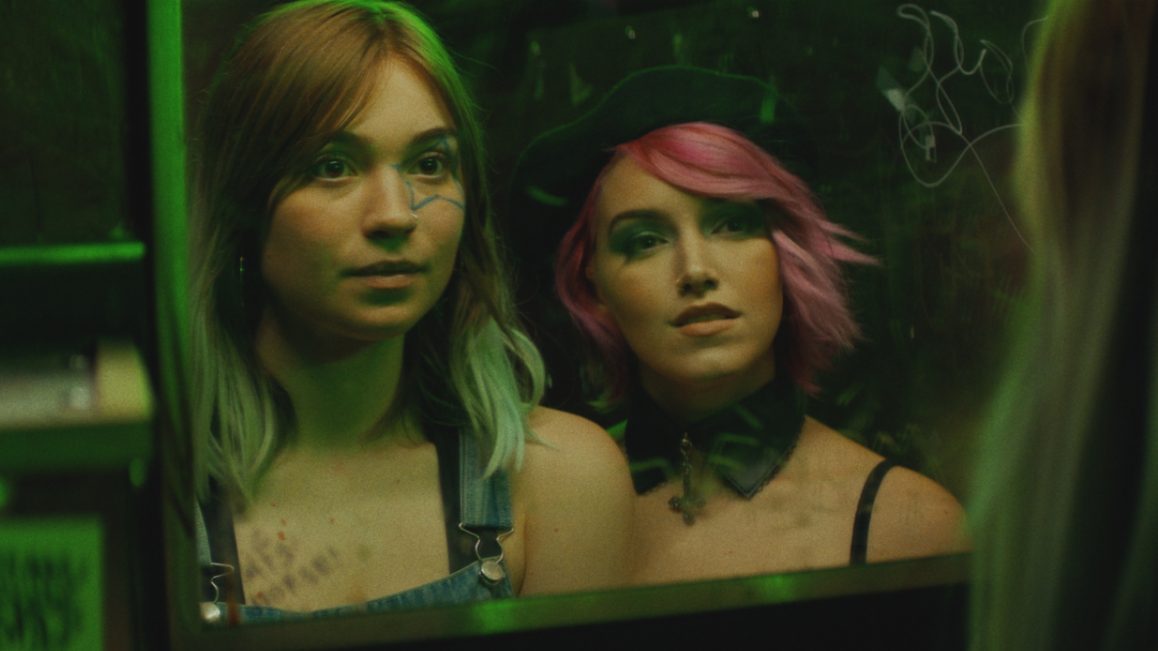
One such artist who Lennon befriends is Bobbi Kitten, singer of the indie pop duo Damn The Witch Siren (who plays a version of her actual self), and a friendship blooms between the two. As Lennon grows more comfortable around Bobbi and her new artist friends–who all continue to inspire her with their original thoughts and art, which she secretly records along the way–she also starts sharing her "original" writing and songs with the hopes of furthering her own art. That is, until it's revealed that Lennon's work might not be as original as she claimed to be.
A feature film debut from directors Ori Segev and Noah Dixon, Poser feels like a unique hybrid of Ingrid Goes West for the indie music scene. The duo of directors create a sense of thriller elements and suspense around the concept of someone who fakes their past in order to fit in. Newcomer Sylvie Mix in the lead role as Lennon, with her quiet yet captivating performance, is transfixing, and her presence in the movie feels like a true discovery.
To that end of "discovery," perhaps the coolest thing about Poser is that Segev and Dixon know Columbus' underground music scene so well, and feature real bands and music throughout the film. By intercutting a wide variety of these real artists and bands throughout the story and seeing their live performances, Poser feels even more real and makes for a fun sense of music discovery that indie and underground music fans will totally enjoy.
Poser ends up taking on some psychological thriller elements that made me think of Nightcrawler, though it doesn't quite go to the same dark depths that I hoped for. The ultimate world that it creates though, and it's introduction to this whole new impressive group of talented filmmakers, actors and musicians is enough for me to recommend this film to all of my hip and tastemaker friends.
87 min. Distributed by Oscilloscope Laboratories.
https://www.youtube.com/watch?v=YfwqoSaSlVY
In 'Watcher,' Maika Monroe Grows Paranoid From a Possible Stalker
Where to watch: 'Watcher' is now playing in select theaters.
Psychological thrillers are such an unsettling genre. We as the audience are forced to question who to trust and what we believe to be real. Unfortunately, this is also very similar to parts of the female experience.
Whether it's from high-profile lawsuits or in daily life, women's truths and experiences remain at the mercy of largely male-dominated cultures that are able to validate or reject so fleetingly. This unbalanced power dynamic is what makes the new psychological thriller Watcher compelling for these times.
Watcher follows Julia (Maika Monroe), a young woman who relocates with her partner Francis (Karl Glusman) to Romania following his job promotion. Currently unemployed and unable to speak the local language, Julia spends her days alone, people-watching through her apartment's large inviting windows.
Things start off well enough. Julia goes to a local coffee shop and attempts to chat with the waiter with her limited Romanian knowledge (and fails). Her feelings of loneliness soon turn into deeper unease as one night, on a walk home with Francis, they pass by a crime scene where a woman has been murdered. She then learns on the news, that the victim–the latest of four young women, all around her age–has been horrifically murdered by a serial killer.
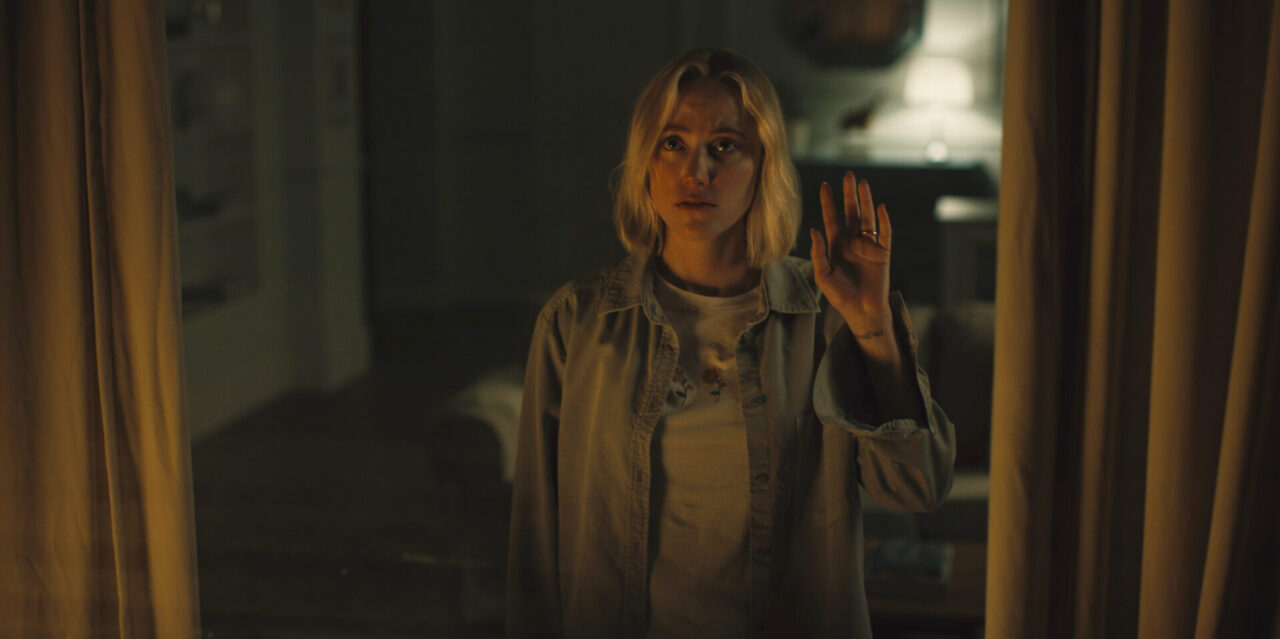
Continuing to spend her days alone (Francis's job keeps him out late a night), Julia's fears only continue to grow. Her public outings become panic-stricken, with one creepy person (Burn Gorman) growing more unsettling; is he following her into the movie theater, and into the grocery store? When she identifies him to Francis as well as the police–without any proof of his wrongdoing–they are left to ask if he following her, or if she herself is obsessing over him? "Maybe he's staring at the woman who's staring at him," Francis reasons, leaving Julia to wonder whether her experience is founded on delusion or real danger.
Written for the screen and directed by Chloe Okuno (in her directorial debut), Watcher follows a classic psychology thriller setup. Its paranoia vibes are undoubtedly Hitchcockian (any time a person voyeuristically watches through a window will draw Rear Window references). But Watcher also has the modern-day social commentary nod of Alex Garland's Men. By putting Julia at the center of this story, Okuno gives this psychological thriller a smart and modern feminist twist.
And yet, while all of these elements are great, Watcher ultimately doesn't build with suspense and dread the way I hoped it would. In part, Julia's character is too under-written. While Maika Monroe conveys the same captivating wide-eyed worry that put her on the map in It Follows, Julia's character remains a little too internally repressed after going through so much mental torment. When she admits halfway through that, "I feel like I'm losing my mind," it feels like just a line delivery rather than something fully earned. Watcher would hit differently if her mental unraveling was closer to, say, Shelley Duvall's in The Shining (perhaps a poor example, as it's widely known that Kubrick put the actress through great psychological anguish to help achieve the performance).
Ultimately, what's most compelling about Watcher is its feminist lensing that equates "being watched" to being victimized. To be "watched" is to be left passive and helpless. And it's what Julia is left to do, by her alleged stalker, her partner, and the police. But when she follows her obsession and becomes the "watcher" herself–going so far as to put herself in danger, in a very bloody and grisly end–she also takes back her power. To be a woman, or to live the female experience, means that owning your truth is something you'll always have to look out for.
1h 31m. 'Watcher' is rated R for some bloody violence, language, and some sexual material/nudity.
https://www.youtube.com/watch?v=KDc6ZLo8sjc

